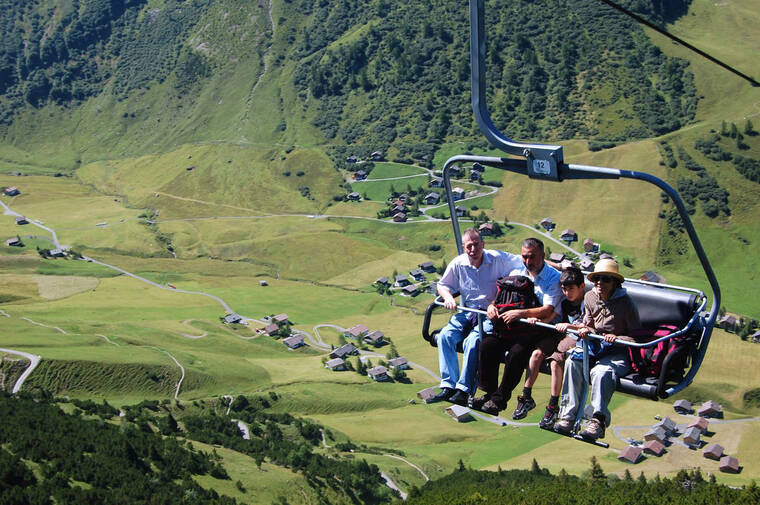Politics
Discovering Liechtenstein: A Tiny Nation with a Rich History

Liechtenstein, a diminutive principality nestled between Austria and Switzerland, offers a unique blend of history and modernity. With a population of approximately 40,000, this landlocked nation spans just 160 square kilometers, making it one of the smallest countries in Europe. Although its size may seem insignificant, Liechtenstein boasts a fascinating heritage and strategic economic advantages that contribute to its stability.
Geographically, Liechtenstein is defined by its dramatic landscape. The Rhine River flows along its western border with Switzerland, while the eastern border is flanked by the rugged Alpine ridges of Austria. This picturesque setting is further enhanced by the presence of Gutenberg Castle, which stands guard over the southern entrance to the country.
Economic Foundations and Political History
Liechtenstein’s economy is heavily influenced by its favorable business climate, which includes low taxes and attractive accounting incentives. The principality hosts numerous firms, particularly in the banking and finance sectors, allowing it to thrive despite its small size. This economic strategy has been particularly successful for the ruling family, the Liechtensteins, who have a long-standing connection to the region.
The history of Liechtenstein is intertwined with that of the Holy Roman Empire. The House of Liechtenstein acquired its territory in 1719, gaining principality status that placed it under the Emperor’s authority. For many years, the princes lived primarily in Vienna, viewing their new land as a mere status symbol. It was not until the 20th century that a prince, specifically Prince Franz I, made the principality his home.
True independence came in 1806, when Liechtenstein’s obligations to the Habsburgs ceased. The country later entered an economic union with Switzerland, which remains evident today as the Swiss franc is the official currency. This partnership has established strong ties between the two nations, with many of Liechtenstein’s public services, including transportation, closely aligned with Swiss practices.
Cultural Highlights and Attractions
Despite its small size, Liechtenstein has much to offer visitors. The capital, Vaduz, is known for its modern architecture, art installations, and cultural venues. The main pedestrian street showcases a variety of shops and hotels, while the local museum tells the story of the principality’s history, emphasizing its connection to the Liechtenstein family.
The village of Triesenberg offers a glimpse into the nation’s past. Its onion-domed church serves as a reminder of the settlers who arrived from western Switzerland centuries ago. Visitors can also explore the natural beauty of the region, with ski lifts providing access to the stunning Alpine landscapes that attract tourists year-round. The mountain resort of Malbun serves as a hub for outdoor activities, from skiing in the winter to hiking in the summer.
While the country may not have an abundance of traditional tourist attractions, it compensates with its breathtaking scenery and rich cultural history. As the sun sets over this tiny nation, visitors can reflect on the unique experiences that Liechtenstein offers in just a single day.
In conclusion, Liechtenstein stands as a testament to the resilience and adaptability of small nations in a rapidly changing world. Its combination of rich history, economic prowess, and stunning landscapes make it a noteworthy destination for those interested in exploring the less-traveled paths of Europe.
-

 World3 weeks ago
World3 weeks agoGlobal Air Forces Ranked by Annual Defense Budgets in 2025
-

 World3 weeks ago
World3 weeks agoMass Production of F-35 Fighter Jet Drives Down Costs
-

 Science3 weeks ago
Science3 weeks agoTime Crystals Revolutionize Quantum Computing Potential
-

 World3 weeks ago
World3 weeks agoElectrification Challenges Demand Advanced Multiphysics Modeling
-

 Top Stories3 weeks ago
Top Stories3 weeks agoNew ‘Star Trek: Voyager’ Game Demo Released, Players Test Limits
-

 Top Stories3 weeks ago
Top Stories3 weeks agoDirecTV to Launch AI-Driven Ads with User Likenesses in 2026
-

 Business3 weeks ago
Business3 weeks agoGold Investment Surge: Top Mutual Funds and ETF Alternatives
-

 Lifestyle3 weeks ago
Lifestyle3 weeks agoDiscover Reese Witherspoon’s Chic Dining Room Style for Under $25
-

 Entertainment3 weeks ago
Entertainment3 weeks agoFreeport Art Gallery Transforms Waste into Creative Masterpieces
-

 Health3 weeks ago
Health3 weeks agoGavin Newsom Critiques Trump’s Health and National Guard Plans
-

 Lifestyle3 weeks ago
Lifestyle3 weeks agoLia Thomas Honored with ‘Voice of Inspiration’ Award at Dodgers Event
-

 Politics2 weeks ago
Politics2 weeks agoLanguage Evolution: New Words Spark Confusion in Communication









